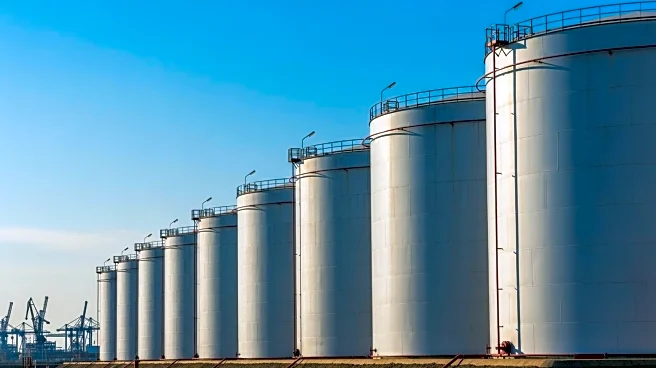What's Happening?
China has significantly increased its onshore crude oil storage, adding 73 million barrels since the beginning of the year, according to satellite analytics firm Kayrros. This brings China's storage levels to 1.18 billion barrels, approximately 60% of its capacity. This increase contrasts with the 40 million barrels added to OECD industry-controlled and government-controlled stocks between January and July. The discrepancy between China's refining rates and apparent demand suggests either significant blind spots in the Chinese market or that refiners are stockpiling refined products. The lack of transparency in China's domestic consumption data further complicates the global oil market's supply-demand balance.
Why It's Important?
The opacity in China's oil stockpiling practices poses challenges for global oil market observers and traders. As China is the world's second-largest oil consumer, its lack of inventory reporting obscures a vital part of the market, potentially leading to miscalculations in global supply-demand assessments. This situation contributes to market volatility, as traders may hesitate to make significant bets due to uncertainties about market fundamentals. The growing use of 'shadow fleet' tankers to transport oil from sanctioned countries further complicates efforts to assess global balances, impacting oil prices and market stability.
What's Next?
The ongoing geopolitical tensions and China's stockpiling practices are likely to continue affecting global oil market dynamics. Analysts and traders will need to rely on satellite and ship-tracking data to monitor China's oil imports and storage levels. The International Energy Agency and other forecasting agencies may need to adjust their demand projections to account for these blind spots. The situation underscores the need for improved transparency and data sharing in the global oil market to ensure accurate assessments of supply-demand balances.
Beyond the Headlines
The lack of transparency in China's oil stockpiling practices raises ethical and strategic concerns for global energy security. As China continues to import oil from sanctioned countries, the international community may need to address the implications of these practices on global trade and geopolitical relations. The reliance on 'shadow fleet' tankers highlights the challenges in enforcing sanctions and monitoring oil flows, potentially leading to shifts in global energy policies and alliances.









